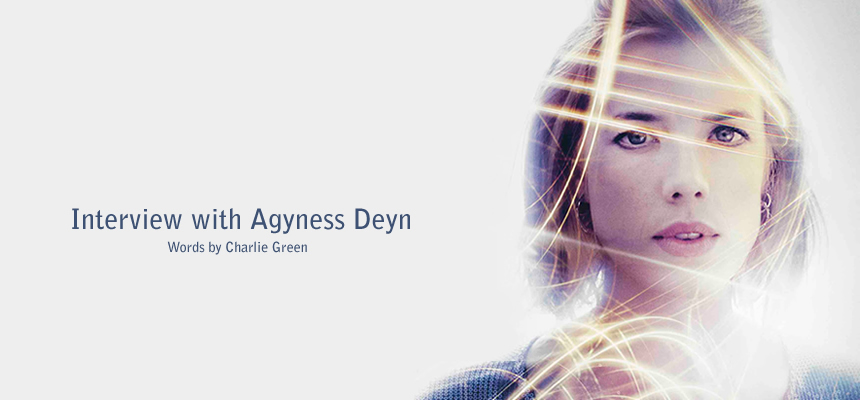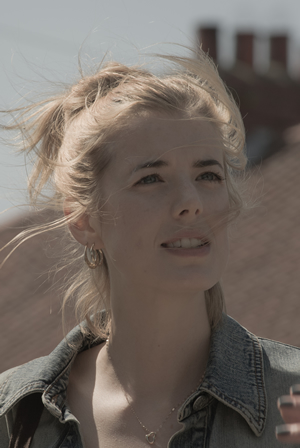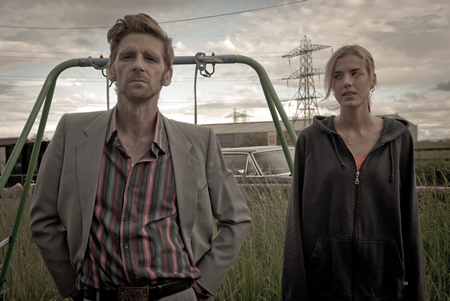
As I and a fellow journalist entered the hotel room in Central London, it was immediately clear that our interview would go quite well. ‘Call me Aggy!’ she states upon introductions in a quiet, yet solace Lancastrian accent.
Agyness Deyn, 31, former queen of the catwalk and holder of the accolade ‘Britain’s most famous model’ is not here to talk about fashion and her dazzling past however, but rather her break into the film industry and more specifically her newest and first lead-role in independent film, Electricity.
Since her breakaway from modelling in 2010, she decided to tackle acting, so naturally one of her first roles was playing Aphrodite in Clash of the Titans – the God of beauty. Deyn also appeared in a few short films from 2010-2012 before her official step-down from modelling.
Raising her filmography status rather quickly she took on the role of Flo in 2012’s drug crime-thriller, Pusher. A definite challenge for anyone, but Deyn prospered in the performance as the female lead character – a stripper come heroin addict.
Today, she is speaking to us about Electricity, an indie film directed by Bryn Higgins which notably had a world-premiere at this year’s London Film Festival, she was quite excited to talk to us about the film.
 ‘It’s been amazing!’ states Agyness. ‘It’s meaningful because of [me] being English and being at an English film festival which is focused on loving British film. So to be part of the London Film Festival is really, really cool’. ‘It’s been amazing!’ states Agyness. ‘It’s meaningful because of [me] being English and being at an English film festival which is focused on loving British film. So to be part of the London Film Festival is really, really cool’.
By this point the sold-out world premiere of the film had taken place less than twenty-four hours before our interview and could easily be described as a success given the standing ovation. ‘It was great, I had not seen it on a big screen – I had seen it once before, but it was really good to be with family and friends. The cinema was big and full. It was great to hear audience reactions while watching it.’
Electricity, based on the best-selling book by Ray Robinson is a refreshing burst for UK cinema. The lead character, Lily O’Connor, played by Agyness is placed in a situation where she has to find her long-lost brother. Alongside this, and perhaps the main focal point of the film is that she has temporal lobe epilepsy and the film illustrates the struggle that it presents onto the big-screen like never seen before. ‘I think that every role has been progression. Pusher was the female lead but the lead character in anyway, but gave me the experience of being heavily involved in a feature [film]. Then this was full on with everything [Lily] goes through.
It is an eye-opening film to say the least, Agyness remembers back to when she was first approached to do the film and what drew her to accepting; ‘I read the script and was just fascinated by the story and how it was this perspective of this strong, rebellious woman and how she experiences her condition of epilepsy and how she manoeuvres life within that, how she fights it, how it affects her whole life. Then I read the book - which is a larger perspective of it. I just fell in love with her and how creative, fascinating and multi-layered she was. Then I auditioned for it and Bryn offered me the part. I was just so excited to get my teeth into it’ she explains enthusiastically.
Within Hollywood there are rarely films about female leads with conditions such as epilepsy, and other than various documentaries there are no films that are directly about epilepsy at all. To do the film - and all of the suffering with epilepsy – justice, Agyness encased herself into research to make her performance seem authentic. Paired with a top London-based specialist she explains how she was ‘talked through it on an intellectual level, on a physical level and emotional level. But then also on an unemotional level – how it just becomes a practicality. My character Lily says “I thrash, I get up and get on with in” - so trying to experience it in all three ways and how it manifests was interesting’.
Given the accolade ‘Britain’s most famous model’, Agyness is no strange to life behind the camera. When asked about any challenges that a leading-role brought she highlighted the fact that she features in over ninety percent of the film’s scenes – it was rare to have a scene with her not in and at any point she would always be on set.
‘You are just constantly at it. Being the lead actor, you also have to do all of the hair, the make-up top of scars and other details. You are the first one to arrive [on set] and the last one to leave. It was definitely long hours and I think that everybody on set was in the same mind-set that we are going to put our hearts and souls into this independent film. All of the hours and everything – the whole cast, crew and everyone did that’.
'Christian and Paul are really good friends of mine. So I got offered the part and then accepted it. They called me up and text me saying "Aggs', are you playing Lily in Electricity? We just got offered the parts of Mikey and Barry"...'
 For six days a week and for seven weeks the film shot – slightly longer than originally planned. During this there were multiple scenes where her character suffers fits and the physicality and severity of epilepsy is authentically shown. At one point Deyn’s face is slammed into a concrete floor – ‘We had stunt men there teaching me how to fall, but at the end of the day you still had to fall! You can fall in a good way and put your chin down or you could break your nose’. For six days a week and for seven weeks the film shot – slightly longer than originally planned. During this there were multiple scenes where her character suffers fits and the physicality and severity of epilepsy is authentically shown. At one point Deyn’s face is slammed into a concrete floor – ‘We had stunt men there teaching me how to fall, but at the end of the day you still had to fall! You can fall in a good way and put your chin down or you could break your nose’.
During her research of the film she met with many people suffering with the condition. Agyness explained that he character has temporal lobe epilepsy – ‘You generally fall forward. Your body tenses, relaxes, tenses, relaxes. But there are strains of epilepsy where it is [only to] relax, so you fall forward. But there is also a kind where you just stiffen and don’t do the common symptoms and fall backwards. It is common for people to either have injuries to the back of their head or the front – it just depends on the person’. Furthermore, she told us people admitting to have broken their noses over nine-times from the epilepsy fits. One person who suffers - but is also a builder - has fallen from high scaffolding several times (Don’t worry - he is okay and well!).
But it was not all doom-and-gloom experiences - the world-premiere of the film at the London Film Festival offered audiences to see the film before its official release on December 12th. In this audience where some people with epilepsy and during a post-film Q&A session the cast and crew were congratulated on how the film accurately it was depicted.
She described one woman at the screening welling up and she said ‘Thank you so much, I have epilepsy and just wanted to say thank you. It really affected and touched me’. Another gentleman who had epilepsy at the premiere said that he was so affected by it that he has never spoke about it before as he didn’t know how to define it. Now he can point and Lily and say “Yeah, that is what it is like”.
What Agyness hopes audiences will take from the film is a greater awareness of epilepsy. ‘I feel that it is a strong message to carry what it is really like and that it is something that we haven’t tied a big bow around’. But underlying in the messages audiences will take from the film – and that Agyness subtly made apparent in our interview was that she is now a proud actress, and that her modelling days are probably behind her.
Her next film, Sunset Song, will also see her take on the lead-role as she plays the daughter of a Scotsman and follows her coming of age story in the early 1900’s. With many other projects lined-up after that, one thing is for sure - Agyness Deyn will be seen on the big-screen a lot more often.
Electricity is released in UK cinemas on December 12th 2014.
To find out more about epilepsy, we recommend that you view this website - http://www.epilepsysociety.org.uk/
Agyness on her influences:
‘Watching old films like Grace Kelly [and] Audrey Hepburn, I really got into them more recently because of sense of fun and freedom in it. They just seem like a real funniness to it and that is really inspiring and to even in drama to have that aliveness in them. People acting are really sad and then the next minute laughing - so that kind of inspirational thing and how they used to make movies is cool. One movie I that I really liked was The Passion of Joan of Arc. That was so beautiful and intense, yet so simple with there being no dialogue and how you can communicate physically.
Agyness on how roles for females have changed:
‘Now I feel that there is a lot of female roles and there [are] a lot more 'real' roles that a woman can connect with on a really strong level. I feel like it was before, not with every film was a projection of what a woman should be before which is also great as well. But it was more like an aspirational, perfect world with a bit more fantasy as in now with woman becoming more prominent in the industry it is become like – “No, this is what a woman is like, and this is what women really go through and have to fight for”. That is what I really try to fight for’. |